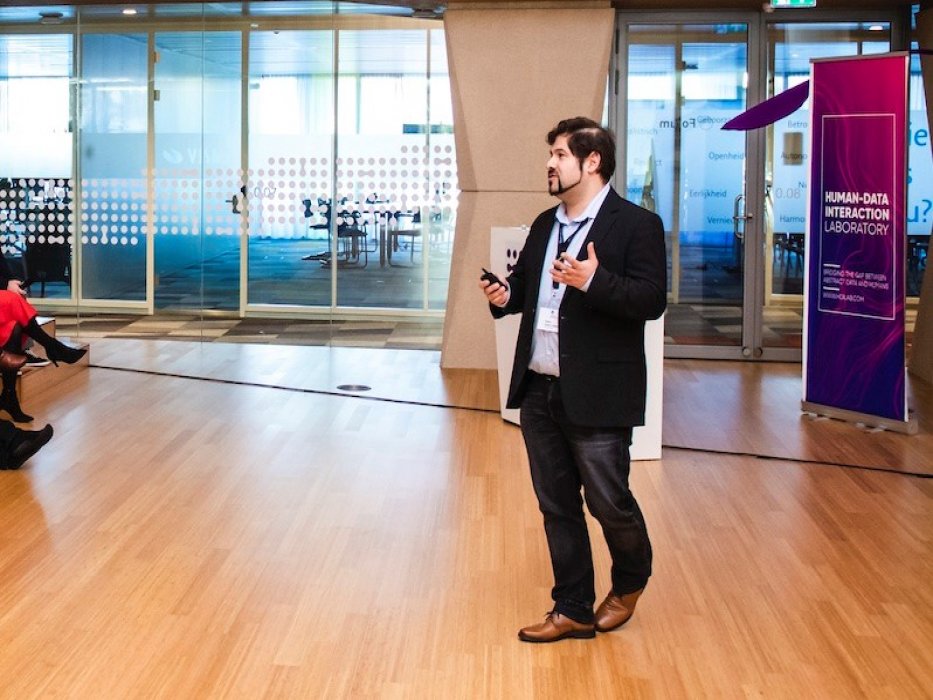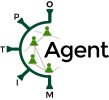Professorship for Human-Computer Interaction and Usable Safety Engineering

The ubiquity of computers and our interaction with them has a significant impact on our lives and our safety. Safety includes the protection of health, life, society, and the environment.
At the workgroup of Human-Computer Interaction and Usable Safety Engineering we deal with the conception, design, and development of digital systems, especially in safety-critical areas.
The central guiding question is: How does the design of technical systems influence safety regarding work, health, life, society, and the environment? The users of such systems are an integral part of the development process and are the focus of our research interest.
From a technical perspective, we are particularly interested in modern networked systems and AI-based applications. In this area of application, a broad field of research is of interest. For example, we study the impact of social media on opinion formation and the spread of disinformation online, as well as its impact on the safety of democracy, society, and health. Issues of social media design and the formulation of communication protocols and their interfaces can have a massive impact on prominent content and its effects on individuals and society.
On the other hand, we study the impact of decision support systems and recommendation systems in safety-critical systems (health, eHealth, public sector, BOS). Here, we primarily address issues of decision autonomy, privacy, and user-adaptive information representation. We seek to understand how different trade-offs between different goal criteria affect acceptance depending on the diversity of users.
The central approach is a multi-method approach that combines methods from computer science and the social sciences. Thus, methods of human-computer interaction (e.g., user-centered design, participatory design, walkthroughs, heuristic evaluation) are combined with methods of psychology (e.g., qualitative and quantitative empirical social research, acceptance research, conjoint methods, structural equation modeling) and with methods of socioinformatics (e.g., agent-based modeling, system dynamics modeling, computational social network analysis) to find suitable answers to the increasingly complex questions of real-world requirements.
Usable Safety & Security
Usable Safety & Security
User diversity
User diversity
Automation, Assistance & Cooperation
Automation, Assistance & Cooperation
eHealth & eCare
eHealth & eCare
Human-Centered Artificial Intelligence (HCAI)
Human-Centered Artificial Intelligence (HCAI)
Informationsvisualisierung
Informationsvisualisierung
Komplexe Systeme
Komplexe Systeme
-
Psychologie-Abschlussarbeiten in der HCI USE-AG
(Bachelor Thesis, advertised)
-
Themen bei der HCIUSE-Gruppe
(Bachelor Thesis, advertised)
-
Entwicklung einer interaktiven Webanwendung zur Visualisierung des „Denk“-Prozesses von Large Language Modellen
(Bachelor Thesis, current)
-
Implementierung erklärbarer Künstlicher Intelligenz in einer Simulationsumgebung zur Unterstützung von Mensch-KI-Teams in der Seenotrettung aus der Luft
(Master Thesis, current)
-
Gestaltung und Entwicklung einer Lernanwendung zur Unterstützung der Langzeitretention bei Typisierung in TypeScript
(Bachelor Thesis, current)
-
Entwicklung einer Browser-Erweiterung für X (ehemals Twitter) zur Darstellung von Warnungen vor Falschinformationen
(Bachelor Thesis, current)
-
Entwicklung eines Webinterfaces für agentenbasierte Epidemie-Simulationen mittels GEMS
(Master Thesis, current)
-
Simulation von Luftaufnahmen für die Erhebung des Verhaltens von Einsatzkräften in Notfallsituatioen bei Nutzung von KI-Unterstützung
(Master Thesis, current)
-
Situative Aufmerksamkeit in der Luftrettung: Entwicklung eines SAGAT-basierten Messinstruments für SAR-Helikopterbesatzungen
(Master Thesis, current)
-
Analyse des Einflusses eines Tutorials auf die Usability einer Website für Wissenschaftskommunikation
(Bachelor Thesis, current)
-
Misinformation Explorer: Ein Framework zur Bereitstellung von Daten über Misinformation in Online-Social-Media
(Master Thesis, 2026)
-
Entwicklung eines webbasierten Interfaces für das German Epidemic Microsimulation System
(Bachelor Thesis, 2026)
-
Nutzungsbereitschaft von kontaktlosen Sonografie-Geräten bei Kindern: Validierung eines Fragebogens zur Erhebung psychologischer Faktoren
(Bachelor Thesis, 2026)
-
Leistung oder Verbrauch - Does it matter? Eine Videostudie über Energy Dynamics Awareness im Eco-Driving
(Master Thesis, 2025)
-
Entwicklung einer Anwendung zur Unterstützung des Risikomanagements bei der Erixx Holstein GmbH
(Bachelor Thesis, 2025)
-
Realisierung einer digitalen Kamera für eine Simulationsumgebung zum Trainieren von KI-Systemen zur Seenotrettung
(Bachelor Thesis, 2025)
-
Systematic Review: The connection between user characteristics and user-linked outcomes regarding healthcare decision-support systems involving uncertainty visualization
(Master Thesis, 2025)
-
Gamification in Extended-Reality: Entwicklung eines Trainingsansatzes für die chirurgische Ausbildung mit der Lübecker Toolbox
(Bachelor Thesis, 2025)
-
Entwicklung einer KI-gestützten Web-Anwendung zur Emotionserkennung in Social Media Beiträgen
(Bachelor Thesis, 2025)
-
Klassifikationssystem zur Erkennung von Misinformationen mithilfe vom LLMs
(Bachelor Thesis, 2025)
-
Entwicklung einer Web-App zur Verfolgung und transparenten Darstellung von Änderungen an Social-Media-Posts
(Bachelor Thesis, 2025)
-
Entwicklung einer gamifizierten Webanwendung zur Förderung des interaktiven Lernens von HTML
(Bachelor Thesis, 2025)
-
Entwicklung einer App zur Untersuchung der Aufmerksamkeit in einem maritimen Such- und Rettungssimulator
(Bachelor Thesis, 2025)
-
Entwicklung eines Simulators zur Untersuchung psychologischer Faktoren bei der Verbreitung von Misinformation
(Bachelor Thesis, 2025)
-
Umsetzung und Evaluation eines Tools zur Verwaltung von Umfragen
(Bachelor Thesis, 2025)
-
Visuelle Annotationsstrategien für KI-basierte Personenerkennung aus der Luftperspektive
(Master Thesis, 2025)
-
Maßnahmen gegen Sprachsterben agentenbasiert modelliert
(Master Thesis, 2025)
-
DX-Verbesserung der IMIS-Webseitenarchitektur im Vergleich zum aktuellen Drupal-System
(Bachelor Thesis, 2025)
-
Entwicklung eines bedürfnisorientierten und erklärbaren Preisgestaltungssystems für die nachhaltige und faire Kostenverteilung durch Künstliche Intelligenz im On-Demand Ridepooling
(Bachelor Thesis, 2025)
-
Erklärbare Künstliche Intelligenz (XAI) in der Computer Vision: Eine systematische Literaturübersicht und Integration in eine simulierte Umgebung zur Analyse von Drohnenbildern
(Master Thesis, 2025)
-
Entwicklung einer realitätsnahen Leitstellen-Simulationssoftware zur Durchführung kontrollierter Verhaltensstudien
(Master Thesis, 2025)
-
Nutzerzentrierte Entwicklung und Evaluierung eines Tools zur Wiederverwendung von Fra-gengruppen in LimeSurvey
(Bachelor Thesis, 2025)
-
Einfluss des Zuverlässigkeitsgrades einer automatisierten Entscheidungsunterstützung auf die Performanz bei der Beurteilung kritischer Situationen mit unterschiedlicher Komplexität
(Bachelor Thesis, 2025)
-
Einfluss dynamischer Risikowahrnehmung auf die Krankheitsausbreitung in sozialen Netzwerken
(Bachelor Thesis, 2025)
-
Agentenbasierte Modellierung von Car-Sharing Buchungssystemen: Analyse von Nutzendenzufriedenheit und Tauschverhalten
(Master Thesis, 2024)
-
Developing a Web-Application for the Creation of Informed Consent Documents for Interdisciplinary Study Planning
(Bachelor Thesis, 2024)
-
DX-Steigerung bei der Evaluation von Barrierefreiheit im Web
(Bachelor Thesis, 2024)
-
Benutzerzentrierte Gestaltung einer Anwendung zur automatischen Datenerfassung für Ausweisdokumente
(Bachelor Thesis, 2024)
-
Integration des CODA-Modells und des Schelling-Modells zur Untersuchung von Polarisierung im öffentlichen Diskurs
(Bachelor Thesis, 2024)
-
Entwicklung einer Webanwendung für Publikationen des IMIS unter Berücksichtigung von Barrierefreiheit
(Master Thesis, 2024)
-
Nutzerzentrierte Exploration von multimodaler Blickinteraktion mit holografischen Interfaces im automobilen Kontext
(Master Thesis, 2024)
-
Entwicklung eines Gebrauchstauglichen User Interfaces für die Initiativen in LiquidFeedback
(Bachelor Thesis, 2023)
-
Implementierung und Analyse diverser Visualisierungen von Wetterdaten innerhalb der Dräger Smart Rescue Anwendung unter Berücksichtigung der Situation Awareness
(Master Thesis, 2023)
-
Gamification als Alternative zur Aufwandsentschädigung in spieltheoretischen Experimenten zum Thema Sozialverhalten
(Bachelor Thesis, 2023)
-
Entwicklung einer webbasierten Experimentaloberfläche für Verhaltensstudien mit Leitstellendisponent:innen
(Master Thesis, 2023)
-
Design und Implementierung von Discrete-Choice-Experimenten für die Bewertung der Akzeptanz von Pandemiekontrollmaßnahmen
(Bachelor Thesis, 2023)
-
Die Bedeutung von Subjective Information Processing Awareness (SIPA) und Affinity for Technology Interaction (ATI) für das objektive Verständnis der Corona-Warn-App (CWA)
(Bachelor Thesis, 2023)
-
Die Auswirkung von Unsicherheitsvisualisierungen auf die Beurteilung von Pandemie-Modellierungen
(Bachelor Thesis, 2022)














